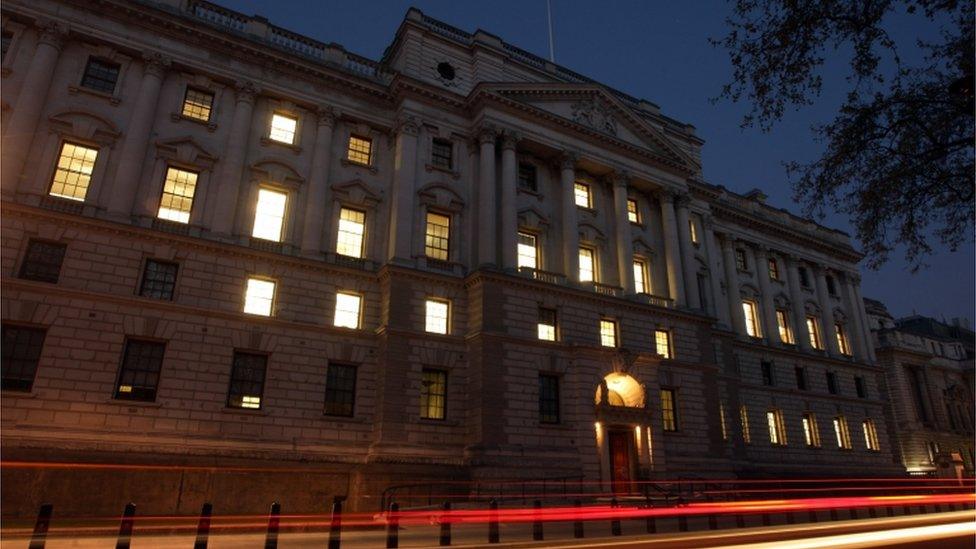Fiscal framework exit strategies emerge
- Published

Interesting moves in the negotiations between the Scottish and UK governments over future powers for Holyrood. You'll know that these are designed to finalise the fiscal framework which accompanies newly devolved tax clout.
By "accompanies", one might equally say "completes". For, without the fiscal framework, there is no agreement as to likely levels of available public spending in Scotland for future years.
In short, these talks matter. They really count. And, since both the Treasury and the Scottish government also have ample counting skills, they are being fought hard.
It is also intriguing to note that as the talks progress - or stall - they are accompanied by emerging exit strategies from both sides. In essence, they are preparing their excuses, with each getting ready to blame the other for failure.
The exit strategies are evident. The Scottish government will say that they were determined to secure new income tax powers for Holyrood - but not at any price.
Ministers profess themselves astounded that their Scottish opponents are seemingly willing to accommodate any offered deal. Said opponents deny such credulity.
The UK government - chief secretary, Chancellor, prime minister - are crafting a back-up narrative which will say that they made every effort to redeem the Vow, to implement the Smith Commission but encountered Scottish intransigence.

The latest round of talks are being held at the Treasury in London
I understand that the Treasury will come up with a new offer at the talks in London this afternoon. It is suggested that this will move towards the position adopted by the Scottish government.
But will it move far enough? The signs as I write are not instantly propitious.
The big issue is over the mechanism to use to determine the reduction in the block grant necessitated by the new tax powers. (More tax clout for Holyrood, less needed from Treasury in grant.)
The Treasury opened the bidding by suggesting that forward mechanism might be the one known as Levels Deduction. In essence, the reduction in the block grant, or Block Grant Adjustment (BGA), is changed each year by a population share of the change in the comparable devolved tax yield in the rest of the UK, rUK.
Snag is that means the actual Scottish tax take from those citizens obliged to pay taxes to Holyrood would have to increase by a proportionately higher amount than in rUK because Scotland starts from a lower tax base and is unlikely to match prospective population increase in rUK. Scotland's economy would have to grow to stand still.
So Scottish Ministers suggested the Per Capita Indexation Method (PCID) which discounts for the population disparities while, arguably, allowing Scotland to benefit from the increased tax take in a buoyant Scottish economy (while taking the hit if that economy falters.)
UK Ministers say that implies, in effect, that Scotland should get its devolved tax yield topped up by contributions from rUK taxpayers. Scottish Ministers say it simply reflects the "no detriment" rule laid down by the Smith Commission, liberating Scotland to benefit or suffer from varying tax takes, in Scotland.
Welfare responsibilities
The new Treasury offer is said to be a compromise and has been described to me as a Barnett formula for tax - and benefits - matching the core of the existing formula which governs spending. Note "and welfare". Scotland's block grant will be cut to reflect tax powers - but topped up to reflect new welfare responsibilities.
I don't yet hear the phrase "final offer" in the ether but the UK government side - while emphasising its willingness to compromise - also tends to talk up its responsibility for protecting the interests of rUK taxpayers. Politically, too, there is talk of what might be sold to the good and sensible people of England.
It is said that the revised offer would have left Scotland slightly better off than under Barnett had the system been in place from 1999.
Will it be enough? Again as I write, that looks like no. The Scottish government counts things rather differently and suspects that the Treasury offer may not be much more than simple (as opposed to per capita) indexation.
At which point enter a battle of the Profs. Anton Muscatelli, Principal of Glasgow University, says the Scottish Government should be wary. Simple indexation, he says, could still leave the Scottish government with a big cut in spending power over time, estimated at a total of £3.5bn.
Jim Gallagher (now a prof, former senior civil servant who advised Calman and Better Together) notes that PCID "hardly seems fair to the rest of the UK."
More talking to come, beyond today, I suspect. But, despite those exit strategies, despite the tough negotiations, I still expect a deal to emerge.
The Treasury wants it. It wants to settle this question, it wants to placate Scotland, it regards the Vow as attaching to the persons of the Chancellor and PM, it wants a package which can be used to convince English voters that Scotland is now fiscally self-governing.
The Scottish government wants it. Ministers want new powers (with the caveats noted earlier), despite the political challenges which would be attendant. They want to extend Holyrood's scope (same caveats.) They suspect that voters might not easily understand the rejection of tax powers, however explained.